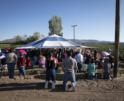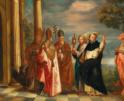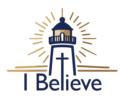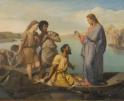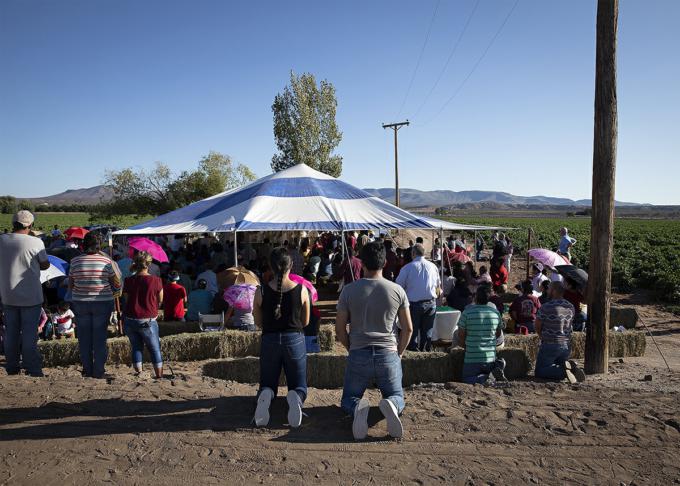
Faith
The action taken by the administration to no longer recognize the concept of protected areas in the course of immigration enforcement (...) does not foster favorable conditions for the free exercise of religion.
In recent weeks, President Donald Trump has taken steps to make it easier for immigration officials to conduct enforcement actions in "protected areas" (often referred to as "sensitive locations"), including places of worship. In other words, the Department of Homeland Security can arrest noncitizens at church, even for non-criminal offenses. Parishioners are afraid.
Reports have emerged of migrant communities who are scared to go to church. There have even been reports of arrests during worship services. While a raid on church property may not be a legal threat to religious liberty in every circumstance, it is certainly a moral one.
People have a duty to offer worship to God. Religious freedom protects the rights of persons to carry out their obligations, ensuring that individuals and communities can fulfill their most sacred duty. The government has its own duties. It ought to ensure a just public order and promote the common good. And the Catechism of the Catholic Church teaches that "Political authorities, for the sake of the common good for which they are responsible, may make the exercise of the right to immigrate subject to various juridical conditions, especially with regard to the immigrants' duties toward their country of adoption" (CCC, No. 2241).
In this way, the government has a right and responsibility to regulate international borders and to enforce just immigration laws, including for the protection of existing residents, be they citizens or otherwise.
At the same time, the government's enforcement of the law cannot come at the expense of human life or without respect for each person's God-given dignity because the "civil law must ensure that all members of society enjoy respect for certain fundamental rights which innately belong to the person, rights which every positive law must recognize and guarantee" (Evangelium Vitae, No. 71).
While accommodating migration undertaken to preserve human life is a responsibility shared by all countries, the church has recognized that more prosperous nations are "obliged, to the extent they are able, to welcome the foreigner in search of the security and the means of livelihood which he cannot find in his country of origin" (CCC, No. 2241).
Put another way, migrants ought to respect the law and culture of the country that receives them, but at the same time, "[p]olitical authorities are obliged to respect the fundamental rights of the human person" (CCC, No. 2237), including the natural right to migrate when "there are just reasons in favor of it" (Pacem in Terris, No. 25).
One of those fundamental rights is the right to religious freedom. To be sure, the right to religious freedom is fundamental but not absolute. Governments may justly limit it for compelling reasons, and by no more than is necessary. But to intrude on the right to fulfill our duties to God is a grave judgment that must be guided by prudence rather than the political winds.
The church's declaration on religious freedom teaches: "Government is ... to help create conditions favorable to the fostering of religious life, in order that the people may be truly enabled to exercise their religious rights and to fulfill their religious duties" (Dignitatis Humanae, No. 6).
The action taken by the administration to no longer recognize the concept of protected areas in the course of immigration enforcement (which even under the prior guidance was not absolute) does not foster favorable conditions for the free exercise of religion. Indeed, by creating a climate of fear and uncertainty around the right to go to church, such action undermines those conditions.
All Catholics and others of goodwill in our country, regardless of their ideas about the best way to enforce immigration laws, should be unified in the conviction that people must be free to fulfill their duties to God without fear. And our immigration authorities, having now been handed very broad discretion over whether to intrude on sacred spaces, should bear in mind the gravity of such a decision. As pastors, the bishops of the United States are committed to walking with all people who seek to fulfill their duty to worship the Lord.
BISHOP KEVIN C. RHOADES IS THE BISHOP OF THE DIOCESE OF FORT WAYNE-SOUTH BEND, INDIANA AND CHAIRMAN OF THE U.S. CONFERENCE OF CATHOLIC BISHOPS' COMMITTEE FOR RELIGIOUS LIBERTY.
Recent articles in the Faith & Family section
-
Freedom of worship for migrantsBishop Kevin C. Rhoades
-
Praying with saints and sinnersFather Robert M. O'Grady
-
'E pluribus unum'Archbishop Richard G. Henning
-
Making Faithful WitnessesMaureen Crowley Heil
-
Into the deepScott Hahn

